Kim Hermanson's Blog, page 6
November 11, 2024
From feeling trapped to finding freedom: The power of expansive spaces
My first degree was in Computer Science and my first job after completing the degree was for an aerospace company.
After the thrill of my first real job wore off, I realized I felt trapped. It felt “small”–there was no “path” there that I was interested in pursuing. The job that looked right on paper felt stifling in reality. I couldn’t bring my full creativity or ideas; each day felt more confining, like wearing shoes that didn’t fit.
When I finally left, I expanded my possibilities… finding a new career path that offered freedom to explore my passions, stretch, and bring my full self. Metaphorically, it was like moving from a dim, cramped room into a wide-open landscape.
In Hebrew, the word for “salvation” translates to “broad space.” There’s something profoundly healing about being in places and relationships big enough in spirit to allow us to expand into who we’re meant to be.
Small spaces feel restrictive and diminish us; expansive spaces offer room to breathe, grow, and connect with our purpose.
In Hebrew, the word for ‘salvation’ translates as broad space
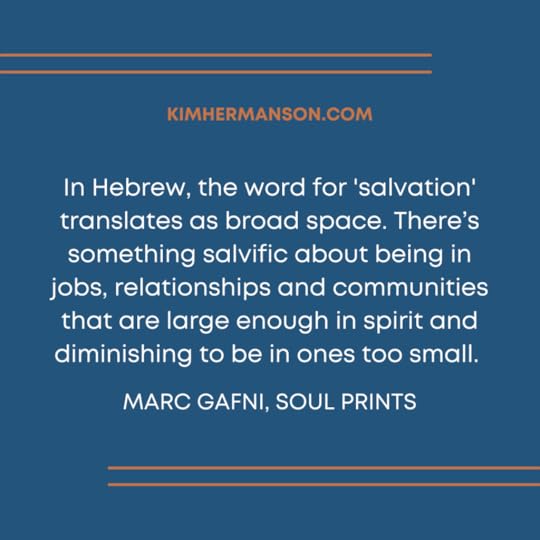
My first degree was in Computer Science and my first job after completing the degree was for an aerospace company.
After the thrill of my first real job wore off, I realized I felt trapped. It felt “small”–there was no “path” there that I was interested in pursuing. The job that looked right on paper felt stifling in reality. I couldn’t bring my full creativity or ideas; each day felt more confining, like wearing shoes that didn’t fit.
When I finally left, I expanded my possibilities… finding a new career path that offered freedom to explore my passions, stretch, and bring my full self. Metaphorically, it was like moving from a dim, cramped room into a wide-open landscape.
In Hebrew, the word for “salvation” translates to “broad space.” There’s something profoundly healing about being in places and relationships big enough in spirit to allow us to expand into who we’re meant to be.
Small spaces feel restrictive and diminish us; expansive spaces offer room to breathe, grow, and connect with our purpose.
November 7, 2024
Your true work is yours to do. You can’t mess it up.
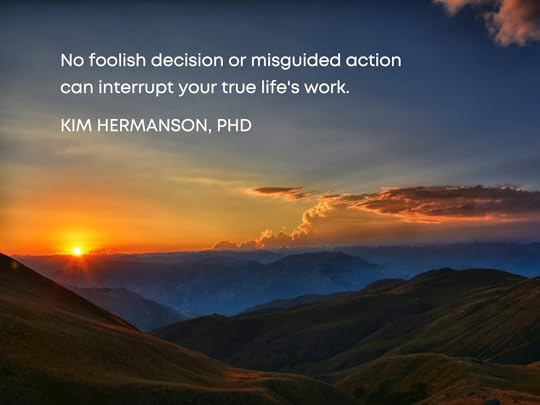
I used to think the mistakes I’d made had ruined my life.
I walked away when a major publisher wanted to publish my book Getting Messy in a different format. I lost a substantial inheritance by investing in questionable stock purchases. I’ve failed to plan ahead. And so on.
But one of the most powerful lessons I’ve learned is that my work isn’t about me.
I’m serving something larger than myself.
When I remember this, it takes the pressure off. I can just be myself (what a relief…)
My mistakes and “failures” didn’t ultimately matter. No foolish decision or misguided action ever impacted the true creative work I was meant to do.
Your true work is yours to do. And yours alone. You can’t wreck your path.
November 4, 2024
Everything falls away by Parker Palmer

A beautiful poem from the magnificent @parkerPalmer, one of my favorite teachers.
“Your life never was the solo turn it seemed to be. It was always part of the great weave of nature and humanity, an immensity we come to know only as we follow our own small threads to the place where they merge with the boundless whole.”
By the way, if you haven’t read Palmer’s book, The Courage to Teach it’s a must, even if you’re not employed as a teacher and have no desire to be.
October 2, 2024
Creativity roots us in what is alive
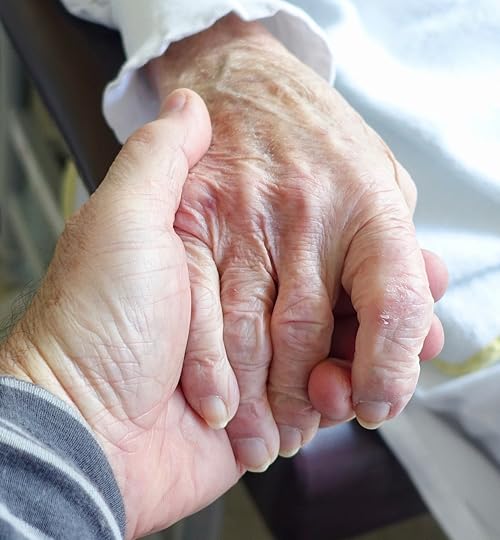 At no point in her life did my mother ever ask me about my work, nor, to my knowledge, did she ever read any of my three books. But in her final hours, something changed.
At no point in her life did my mother ever ask me about my work, nor, to my knowledge, did she ever read any of my three books. But in her final hours, something changed.
It was the height of the pandemic and I was teaching an online course at Pacifica Graduate Institute. Sitting next to my mother at her bedside, we quietly looked into each other’s eyes. I told her I was in the middle of teaching a course and needed to step away occasionally to respond to student posts.
It was a profound moment I will never forget, because she asked me what I was teaching and what the students were writing about. I told her the course was “The Healing Power of Creativity” and I took that moment to acknowledge her own creativity. She spent a lifetime creating magnificent gardens; she loved music, was the organist at her church, and made sure all of her three children could play instruments. Her life was about beauty.
I also said that my Dad wasn’t creative and she immediately corrected me. “Oh no, your dad was very creative.”
Her words shifted me and shifted how I saw my late father. All of a sudden I had a larger view of him… and much more appreciation for what he brought me.
We all have times of barrenness in life—-when the kids go off to college, we get a divorce, the new business venture doesn’t work out.
But creativity roots us in something far greater than the external events of the day. To regain a sense of rootedness and meaning, all we have to do is pause… and create something.
It’s a pause for what is alive. To engage with what is real.
Our creative work is the personal legacy that we each leave to this planet.
In their lives, my parents never embraced their creativity.
But I got my creativity from them.
April 2, 2024
January 24, 2024
Mihaly Csikszentmihalyi shaped & influenced the lives of many students, including me
Thirty years ago, I was bored and directionless in a Ph.D. program at the University of Chicago. My father had just died somewhat unexpectedly at the youthful age of 57 and I committed from that moment on, I would ONLY do work that was fun, juicy, and creative.
After a couple of months spent grieving my father’s passing, I threw out all the boring shit I’d been working on and let my imagination wander to the things I felt most passionately about. I wrote up two pages of musings about how adults learn in everyday life and dropped them off at the office of Mihaly Csikszentmihalyi (“Mike”).
Mike liked what I wrote. He agreed to be my academic advisor and took me under his wing. I’d never had a mentor before and felt somewhat confused and disoriented by his interest. Up to that point, I’d never had any kind of adult take any interest in me at all. I’d always attended huge public schools where I was lost in a sea of faces.
Mike encouraged my ideas, read everything I gave him, asked me to coauthor articles with him, and found an academic position for me when I graduated. In my final dissertation hearing, he defended my radical ideas in front of the other conventional (stodgy) faculty members. But he also pulled me aside afterwards and instructed me to NEVER mention the heart in an academic setting. Ever. He said I’d be “laughed out of the room.” At the time, it felt like criticism. But looking back, I can see he was speaking from his own experience. He soon left the University of Chicago for more academic freedom at Claremont Graduate University.
I felt like I disappointed him when I escaped to Montana after completing my Ph.D without publishing the research that I’d conducted with him. I also declined the academic teaching job that he found for me.
I needed to be a hippie for awhile.
After several years of nomadic life, I reconnected with Mike. Academically, I felt like a failure, but he never treated me that way.
In the subsequent years, he graciously read and gave me feedback on drafts of my books, recommended me for teaching positions, and introduced me to his agent (he cautioned me that it would be a long shot and it was… too long of a shot.)
My story is only one out of hundreds. Mike shaped and influenced the lives of many, many students throughout his long career.
We don’t fully realize the impact that someone has had on us until they’re gone. It’s only in hindsight, looking back, that we begin to see and understand their significance.
Today is the one-year anniversary of his death.
I’d like to thank him for his kindness, intelligence, creativity, and grace. And for seeing me.
Mihaly Csikszentmihalyi shaped & influenced the lives of many students, including me.
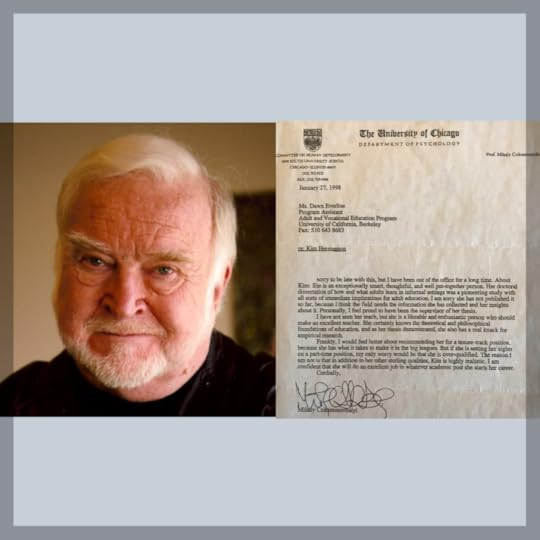
Thirty years ago, I was bored and directionless in a Ph.D. program at the University of Chicago. My father had just died somewhat unexpectedly at the youthful age of 57 and I committed from that moment on, I would ONLY do work that was fun, juicy, and creative.
After a couple of months spent grieving my father’s passing, I threw out all the boring shit I’d been working on and let my imagination wander to the things I felt most passionately about. I wrote up two pages of musings about how adults learn in everyday life and dropped them off at the office of Mihaly Csikszentmihalyi (“Mike”).
Mike liked what I wrote. He agreed to be my academic advisor and took me under his wing. I’d never had a mentor before and felt somewhat confused and disoriented by his interest. Up to that point, I’d never had any kind of adult take any interest in me at all. I’d always attended huge public schools where I was lost in a sea of faces.
Mike encouraged my ideas, read everything I gave him, asked me to coauthor articles with him, and found an academic position for me when I graduated. In my final dissertation hearing, he defended my radical ideas in front of the other conventional (stodgy) faculty members. But he also pulled me aside afterwards and instructed me to NEVER mention the heart in an academic setting. Ever. He said I’d be “laughed out of the room.” At the time, it felt like criticism. But looking back, I can see he was speaking from his own experience. He soon left the University of Chicago for more academic freedom at Claremont Graduate University.
I felt like I disappointed him when I escaped to Montana after completing my Ph.D without publishing the research that I’d conducted with him. I also declined the academic teaching job that he found for me.
I needed to be a hippie for awhile.
After several years of nomadic life, I reconnected with Mike. Academically, I felt like a failure, but he never treated me that way.
In the subsequent years, he graciously read and gave me feedback on drafts of my books, recommended me for teaching positions, and introduced me to his agent (he cautioned me that it would be a long shot and it was… too long of a shot.)
My story is only one out of hundreds. Mike shaped and influenced the lives of many, many students throughout his long career.
We don’t fully realize the impact that someone has had on us until they’re gone. It’s only in hindsight, looking back, that we begin to see and understand their significance.
Today is the one-year anniversary of his death.
I’d like to thank him for his kindness, intelligence, creativity, and grace. And for seeing me.
November 28, 2023
an ode to Jacob Needleman
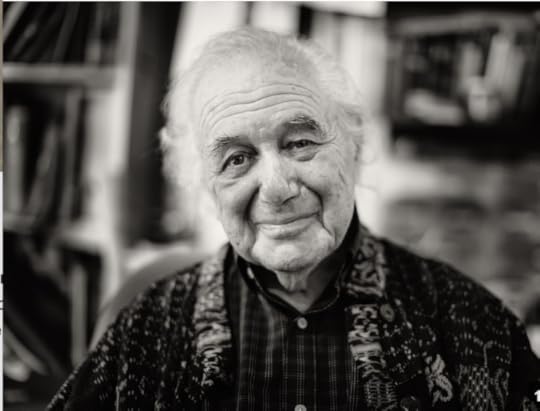 The brilliant philosopher Jacob Needleman passed away one year ago today.
The brilliant philosopher Jacob Needleman passed away one year ago today.
Needleman is the one who famously said, “We’re built to serve something greater than ourselves.”
In a letter to the president of the Fetzer Institute, Needleman wrote something else that has continued to inspire me throughout my career:
“I believe that the group is the art form of the future…In our present culture the main need is for a form that can enable human beings to share their perceptions…and through that sharing, to become a conduit for the appearance of spiritual intelligence.”
I love that.
And in an interview with The Sun Magazine (writer D. Patrick Miller at Fearless Books), Needleman spoke of his experiences with D.T. Suzuki in ‘stopping the mind.’:
MILLER: Suzuki was inducing in you the same experience that a Zen koan is meant to induce: stopping the mind.
NEEDLEMAN: Yes, because to stop the mind within such a context is to touch someone’s being, to touch his or her yearning, the essential need in the person for a relationship to something higher.
MILLER: So when Suzuki threw you back on the experience of your own being, you found yourself wordless.
NEEDLEMAN: Yes. At the point of encountering your own being, you either have to remain silent or start singing. If you’re going to talk about “being” in any meaningful way, you may have to use special language, perhaps mythic language. Myth, in this context, is not falsehood. It’s the language of the heart and mind together, and it surpasses our ordinary way of expressing ourselves. Nature often speaks to us in mythic language. We tend to paper over nature with scientific language and think we’ve fully described it, but to look at nature only in that way is to muzzle it.
NEEDLEMAN: Suzuki was not going to give me an intellectual answer; he meant to put me in a questioning state so that I could experience something about the self — what it isn’t, what it could be, and so on. As Kierkegaard said, direct communication between people is not real communication. Real communication is indirect: it allows one to experience something rather than intellectually understand it.
Bless his brilliant work.
October 10, 2023
The Silent Language of Beauty: Listening Beyond Words
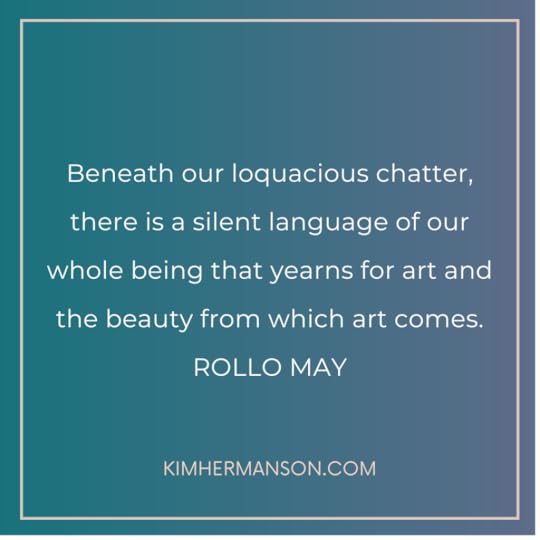
The existential psychologist Rollo May published a ton of books while he was alive. I’ve read two: My Quest for Beauty and The Courage to Create.
Rollo May helped develop and popularize existential psychology—a branch of therapy that explores universal aspects of human existence, including concepts like death, freedom, responsibility, and meaning. It’s a psychology that asks us to look beyond the ordinary and to understand life as more than a set of thoughts or verbal expressions.
May believed there’s something deeper within us—a “silent language” that transcends our loquacious chatter and speaks from the core of our being. As he put it, “Beneath our loquacious chatter, there is a silent language of our whole being that yearns for art and the beauty from which art comes.”
It’s a kind of listening, not with our ears but with an openness that extends beyond our rational minds. When we tap into this silent language, we’re not just seeing or hearing beauty; we’re experiencing it as something alive and essential. This yearning, which exists in all of us, invites us to move beyond mere appearances and into something richer, something that reaches to the very source of life itself.




